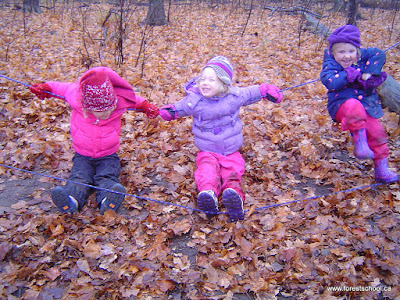Mud Day was the perfect way to kick off our summer camp this year! We have many new friends in the program and we had plenty of fun getting to know one anther as we squished, rolled and even slid in the mud!
We ran out to the playground and much to our amazement there were buckets, pools, sensory tables, and more filled with MUD! We kicked off our shoes as quickly as possible and jumped into the buckets. We noticed that the mud was "squishy and wet and cold."
We enjoyed squishing the mud between our toes and making big mud splashes. Next, the children got the idea to paint the cars with mud. C said, " It's so cold on my feet! Wow it's nice!" We used the fly swatters and brooms to paint a large mural with mud. It was amazing to see the shock in the children's faces as the mud flew back and hit them in the face. The end result was an amazing mural of dripping mud and water. As it dried the children came to touch the mud. We enjoyed having a small water and mud fight and splashing each other.
In the afternoon, we came back out for some time in the mud kitchen. We filled the sinks up with water and mud and the children went wild cleaning and making lots of soup and pizza. We also put our mud kitchen to good use as we cooked up mud treats & decorated the walls with mud handprints.
This day was so exciting for all of us to explore this messy, muddy world! Our toddlers love any opportunity to get messy and explore. We wish that every day could be mud day! The children were super excited to play in the mud. Some were a little cautious at first while others dove in. Literally!! The pool full of mud was a hit. They jumped right in squishing it between their fingers and toes, sliding in it, making mud balls and even rubbing it all over their legs and arms. They also enjoyed the water and mud table. Some friends made "mud pies, smoothies and milkshakes".
Their favourite thing to do with all the mud was to chase Michelle with it. They got her good. She was covered in it! I think she had just as much fun as they did!
Indoors (after we hosed down and dried off) we enjoyed mud dough (playdough with coffee grounds in it), muddy water and brown mud paint. Getting dirty was a whole lot of fun today! Brooke made us a special afternoon snack in honour of mud day. Dirt n worms of course! Yum! (we'll also have fruit too).
Summer Camps at Discovery started June 29th and run until week 10, Sept. 4th.
Here is a list of our 2015 camp themes.
Week #1 Oh Canada, "Eh"?
June 29 -July 3
Kicking off the summer could only be made better by celebrating our wonderful country together! We will have a week filled with red and white fun and facts and will learn about a wide range of all things Canadian. Children will be introduced to our nation’s diverse and interesting cultures and languages, lands, sports and leisure activities as we enjoy fun in the sun together.
Week #2 Globe Trotting
July 6-10
A trip around the world in a week! Experience and learn about foods, crafts, culture and languages of other countries on the map. Children will also go on a “geo-caching” adventure this week.
Week #3 Eat This!
July 13-17
Using our garden and smart grocery choices to learn and create healthy, nutritious and delicious concoctions together. We will also learn about herbs and spices, their health benefits and just how they change the flavour of the things we like to eat.
Week #4 Befriending the Forest
July 21-25
Connecting with nature through daily forest adventures, hikes and picnics. We will get to enjoy a small taste of Forest School as we discover ropes, shelters and tool use together.
Week #5
CLOSED July 27-31
Week #6 Gelling with Geology
Aug 4-7
What is a geologist and what do they do? Learning about rocks and minerals and how they are mined, where they are found and what they are used for. We will also explore and learn about fossils and where they come from.
Week #7 Community Helpers
Aug 10-14
Learning about some of the many helpers and emergency professionals in our community, what they do and why we need them.
Week #8 Weather Wonders
Aug 17-21
Examining weather together in its many forms from precipitation and temperature to wind, rainbows and extreme weather. We will also learn about why and where different types of weather occur around the world.
Week #9 Space is the place!
Aug 24-28
Exploring the stars, satellites and planets. Learning about our solar system and what exactly those astronauts are up to and having fun with rocket ships and “aliens”.
Week #10 The Birds & the Bees
Aug 31-Sept 4
Learning how to identify Ontario’s birds as well as how to attract them to our yards through feeding and gardening. We will also learn about the importance of bees in nature and the problems they are facing
For more information about our
summer camps visit our webpage.



















